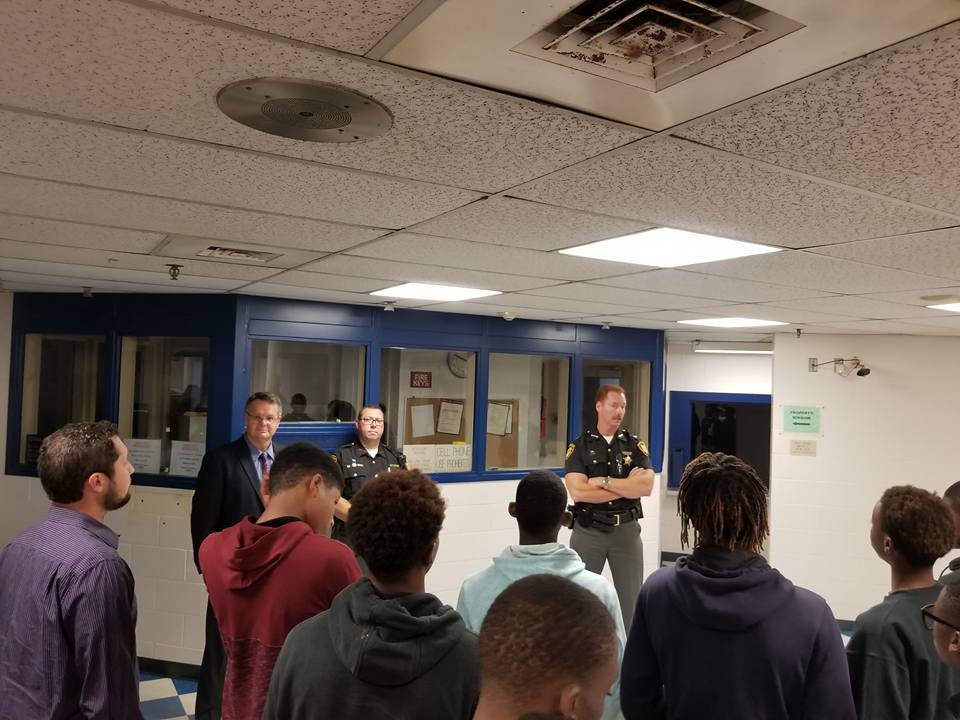
SuperSeeds: Don’t Suspend, Educate!
SuperSeeds Founder Candice Tolbert is passionate about eliminating school suspensions. She wants schools to really educate children about the consequences of their behavior, instead of taking them out of their lessons for a day or two or three. And Tolbert believes that a lot of the suspensions are based on bias—bias due to color, or in the case of religious schools, a possible bias against children of differing faiths.
Whatever the root cause, when it happened to her child, Tolbert wasn’t going to sit back and just let it happen. She made a stink, going to court to have the suspension removed from her child’s school record. And she started a nonprofit organization called SuperSeeds to prevent it from happening to other children.
Which is remarkable. It’s one thing to stand up for your child, quite another to see the bigger picture and to take great pains to correct a societal ill, improving education on a community-wide basis. Candice Tolbert is, we believe, a guiding light, and what SuperSeeds has achieved is proof of that. What could we do but say yes to SuperSeeds’ application for a Kars4Kids small grant?
And so we did. We also spoke with Candice Tolbert about the work of SuperSeeds; its aims and achievements. We hope you’ll be inspired.
Kars4Kids: You started SuperSeeds after your son was suspended from school for playing a staring game and you went to court to have the suspension removed from his school record, which drew national attention. How old was your son? What harm would come from having a suspension listed on his record?
Candice Tolbert: My son was 12 years-old in the 7th Grade while attending St. Gabriel Consolidated School. The problem with the suspension was that this is how the school-to-prison pipeline is started. Studies show that suspensions do not modify behavior, but will lead to more suspensions feeding into the school-to-prison pipeline.
Every year, Ohio schools issue more than 100,000 out-of-school suspensions to Ohio children.[1] More than half of those suspensions are for “disobedient or disruptive behavior,” not for violence, drugs, alcohol or possession of weapons. The harmful effects of removing children from the academic process rather than choosing other alternatives for school discipline feeds into the school-to-prison pipeline. The ongoing effects of these practices have a profound impact on the school’s report impacting retention, grades and the number of student graduates leading to problems within our community.
In further review, we find that both disobedient or disruptive behavior and harassment/intimidation are both subjective and disproportionately affects students. Subjective determinations of disobedient or disruptive behavior and harassment or intimidation both may be susceptible to the influence of implicit bias. Students who are pushed out of the classroom through disciplinary measures are denied educational opportunities, which can have lasting life impacts.
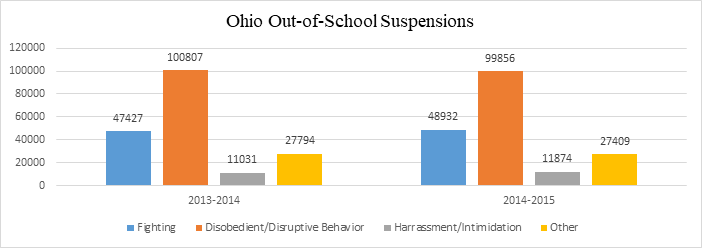
Deciding when and how to apply discipline measures in schools is an important process that has immediate and long-term implications for students. The weight of making the right or wrong decision is in the hands of school administrators. However, school administrators do not always have adequate funding or the staffing capacity to implement alternative resources for school discipline. On one hand, school administrators sympathize with teachers that are focused on teaching and preparing students for tests understanding their need to remove any disruptions to that process. On the other hand, school administrators have little to no sympathy for parents that are unruly and disruptive themselves. The influences of the teachers and the parents contribute to the increased number of suspensions and expulsions.
Kars4Kids: Why such a harsh punishment for your son’s so minor infraction?
Candice Tolbert: Prior to suspending my son, they suspended a black female for 10 days for using a nail clip in school stating that she brought a weapon. In my son’s case, school had just started, he had no history of disciplinary actions from the school and was in fact popular with the kids in school. The problem was not with the kids, but with the parents and the response from the administration.
The incident happened on a Monday morning break. No teacher was around to witness it and the accusing student never reported it to a teacher. My son and the girl he stared at never stopped communicating and engaging with each other in the days leading up to the suspension. The suspension didn’t occur until Thursday.
When the girl came home from school on Monday, the day of the incident, she told her mother about her day. On Tuesday morning, the mother of the female student wrote an email to the principal stating that her daughter was afraid to come to school because my son had stared at her. On Tuesday, two teachers took my son into a room and characterized what he had done to the female student without listening to his side of things. They told him that he would be suspended. He cried, not understanding, explaining that it was just a game, that the girl was laughing and they were just having fun.
On Wednesday, my son wrote a letter (which circulated on the news) trying to explain to the principal that it had been a game and that he didn’t want to be suspended (as threatened on Tuesday by the two teachers). However, the suspension was still issued at the end of the day on Wednesday and served on Thursday. We were denied all rights to appeal the decision or any hearing prior to serving the suspension.
When I received the call explaining all this, I asked: Did my son make any threats of or express any intentions of evil while staring at the girl? The response was no. I asked what was the girl doing while he stared? The response was that she was laughing and giggling.
I asked did the girl ever say that she was afraid? The response was no. I asked did she say stop? The response was yes, she did.
My final question was, of course, did he stop?
The response was that he did, immediately stop.
So, I could never figure out the reason for the suspension to even provide a lesson for my son. It would be easy to explain to him where he was wrong if he expressed evil intent, or if he didn’t stop when she asked. Being that none of that was the case, I didn’t feel the suspension was warranted. When I went to the priest to contest the suspension on his record, the priest laughed when I told him the scenario. But then I told him what I believed to be the reason for the suspension, a religious school’s bias against students of other faiths, he stopped laughing but never did anything to change the outcome of the suspension on his school record.

Kars4Kids: What does a child learn from being suspended for a minor infraction?
Candice Tolbert: Quite honestly, the child learns nothing. Studies have shown that suspension from school for even good reasons does not modify behavior, so it was worse for my son because we could not find a lesson to teach him from the incident. In fact, the consequences of out-of-school suspensions are to create:
- More suspensions. When recorded in a school record, a suspension follows the student to the next teacher, the next grade, etc.
- Lack of trust in administration—The student loses respect for school authorities
- Poor academic performance—When a student misses out on school, grades can suffer.
Kars4Kids: Tell us about the Options Day program you created?
Candice Tolbert: My goal is to “disrupt the school-to-prison pipeline.” Our Option’s Day Program is about taking at-risk youth on a city tour to show them the real-life consequences of behavior. I want to deter youth from the prison pipeline, so I show it to them. The tour includes:
Jail tour: We begin the day by sitting in arraignment court to see real-life cases brought before a judge. Students get to interview the judge, attorneys and law enforcement officials. We show them what happens when you are arrested and they get to see a jail cell. The students then have a question and answer sessions with an incarcerated inmate. This is the most powerful part of the tour. No more stories or hypothetical situations: the students hear from the inmates what life is really like in jail.
Hospital tour: We then go to University Hospital to learn about trauma and violence. Students hear from the top trauma surgeons in Cincinnati and from first responders. Most importantly, students have a question and answer session with a patient who was shot six times.
College tour: We end the Options Day tour at a local college or university to explore career options and learn about life after high school. The students get to meet college students to learn how they survived high school and to hear what life is like in college.
The tours last a day and a half, with the college tour being on the final day.
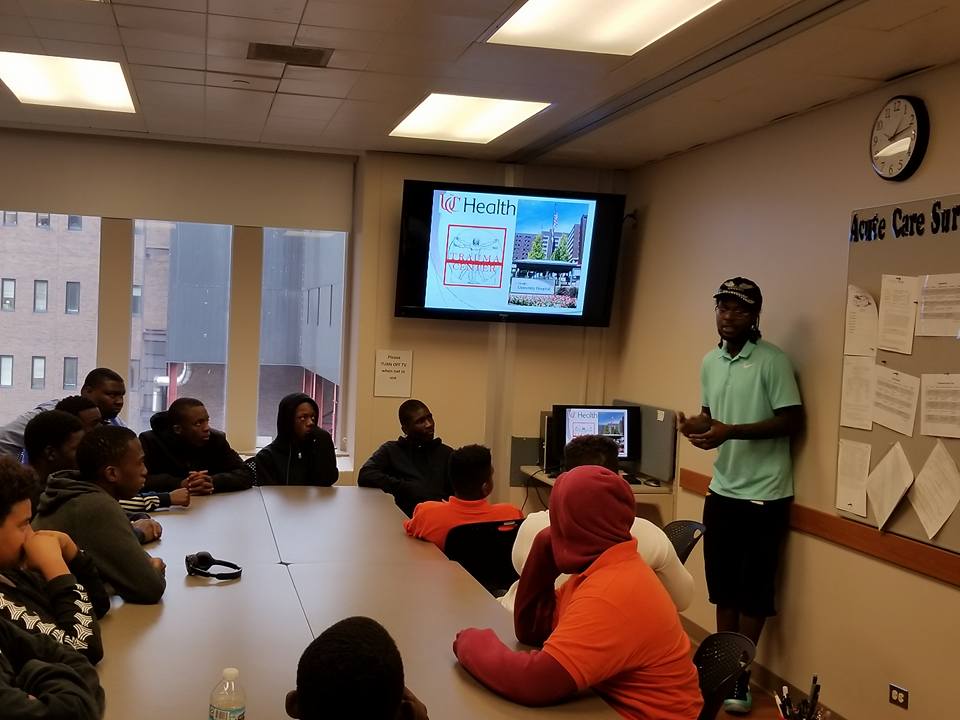
Kars4Kids: Options Day seems great for a severe school infraction, but how is SuperSeeds addressing the imbalance of a severe punishment for minor infractions, for instance suspension for playing a staring game?
Candice Tolbert: SuperSeeds not only works with the students, but also with school administrators. Our goal is to reduce the number of out-of-school suspensions and to keep as many kids seated in the classroom as possible. It is critically important that we address de-escalation from both sides of the spectrum.
I began the work with SuperSeeds in October 2016 with the Lockland School District. That first year, there were 1,500 referrals from the classroom to the principal’s office for discipline. Each month, SuperSeeds hosted 4 boys and 4 girls on the tours and sometimes more. The teachers began training in social-emotional awareness, de-escalation, and other topics related to student behavior. We are so happy to report that with the combined efforts; they were down to only 100 referrals for the 2017-2018 school year.
We are an alternative to school suspension, so the school superintendent has to be willing to buck the traditional Zero Tolerance school policy to provide the alternative. Parents are grateful to learn that what could have been a 3-day out-of-school suspension turns into a one-and-a-half-day field learning experience in which the child can turn in missing homework; return to school in one and a half days; and have it counted as an excused absence, besides. The student appreciates the learning experience and is required to write an essay about the Options Day experience. It is a win-win program and we should be in every school across the nation, which is why we need more support for growth!
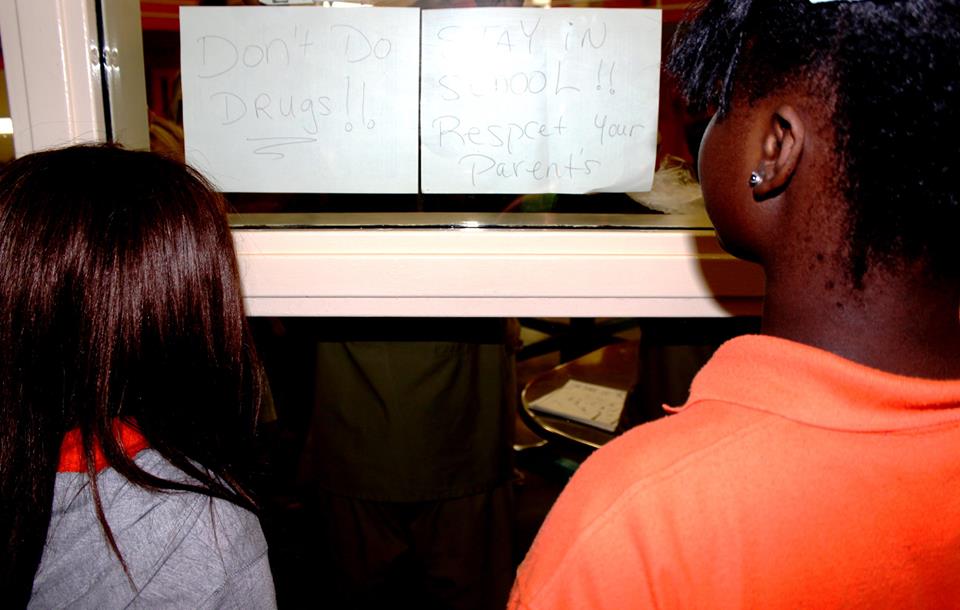
Kars4Kids: Have the schools been supportive in implementing the SuperSeeds program?
Candice Tolbert: The first year, SuperSeeds provided services in three schools and last year, we were in five schools. We’ve received inquiries from many more schools in Cincinnati. We have interested parties that would like for me to bring SuperSeeds to Dayton and Akron, Ohio, and to Indianapolis, Indiana. However, SuperSeeds does not at present have the financial capacity to expand the program outside the Greater Cincinnati area. Our vision is that one day every school will provide students with a SuperSeeds Options Day program tour in every city across the nation. It is critically important for our youth to understand that there are real-life consequences to behavior from which they are not exempt.
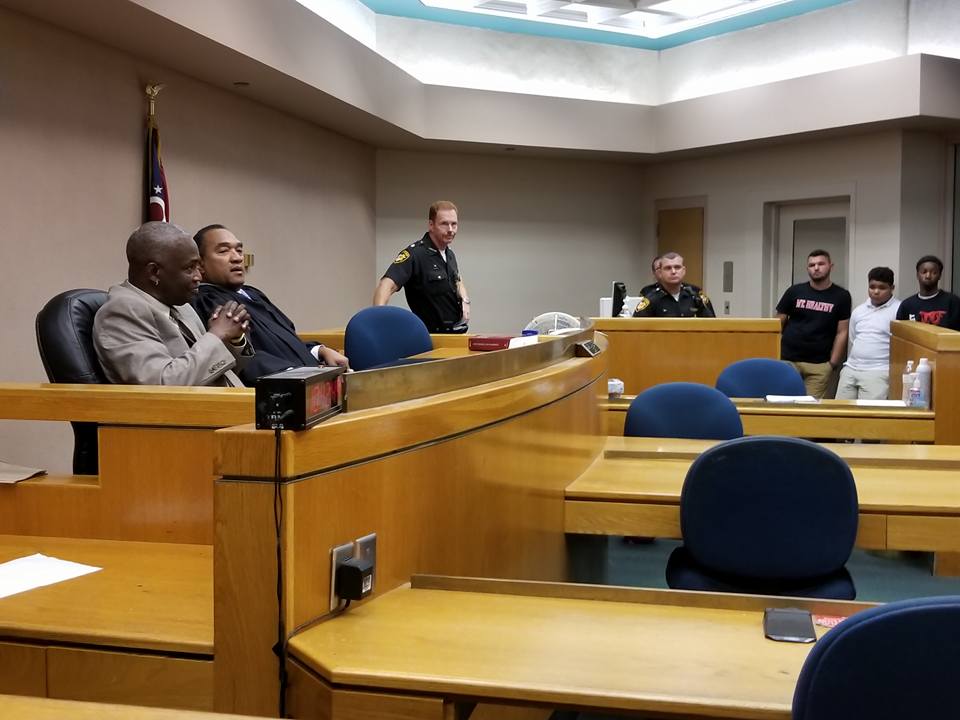
Kars4Kids: Tell us about your 3-Step Approach.
Candice Tolbert: Our 3-Step Approach is to work with the three relevant parties (school administrators, parents, and students) according to their differing needs: We assist school administrators in exploring de-escalation skills, cultural competency, and disciplinary alternatives; and we provide them with evaluation and feedback. We provide mediation assistance between administrators and parents and a platform for open dialogue in the form of community forums.
For parents we offer mediation assistance with school administrators. We guide them to find and connect to workable solutions and resources. We work on, for example, building relationships and developing social and emotional intelligence, and de-escalation skills. We also assist parents in gaining an understanding of school policies and civil liberties.
The students, meanwhile, are provided with Options Day tours as a discipline alternative. We offer student intervention programs in de-escalation skills, conflict resolution, anger management, social emotional intelligence, leadership skills, financial literacy, and entrepreneurship.
Kars4Kids: Your website calls for volunteers who are professionals in specific areas. Can you explain why you need volunteers who are attorneys or are in law enforcement, for example?
Candice Tolbert: One of our missions is to bridge the relationship between youth and law enforcement. Based on what our youth have seen in the media; heard from parents; and witnessed in the community with riots and marches, we have a generation of youth that will grow up with a lack of respect and trust in law enforcement. It is our goal to be the bridge between our youth and law enforcement.
We want our youth to understand the critical roles of all areas of law enforcement. As we take them through the Options Day tours, we highlight all jobs and careers in the areas of law enforcement. We want them to become interested in being a part of the change they desire to see. We need the entire workforce of law enforcement to be diversified from the police officer to the judge.
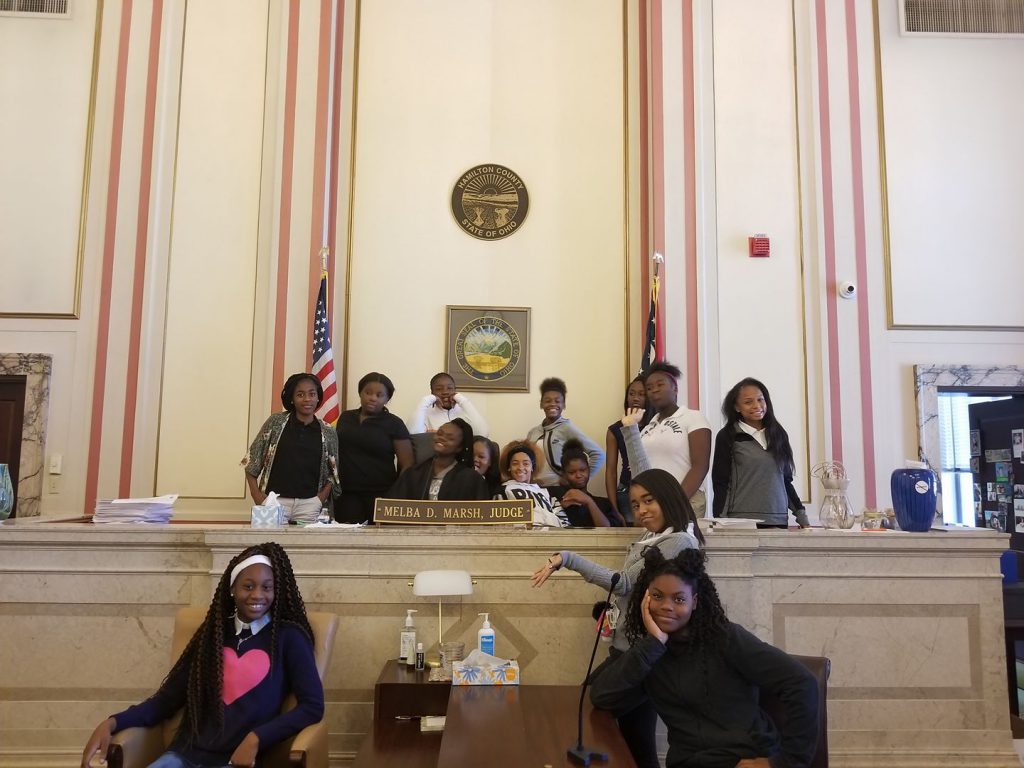
Lastly, we want volunteers from these areas specifically because they see, every day, the impact of youth entering the system as juveniles going to federal prison due to such issues as lack of education or attempts at behavior modification. There are too many in-jail programs and programs for re-entry. We need law enforcement to focus instead on prevention.
SuperSeeds has created the door for our youth to see where their behaviors can take them. We need for our youth to walk out and modify their own behavior based on the real-life evidence presented before them. Our law enforcement officials can explain the law to them in order to dispel erroneous perceptions and myths while stressing to youth that they must obey the law and respect authority.
Kars4Kids: What’s next for SuperSeeds?
Candice Tolbert: SuperSeeds is working to build capital. We need community support to assist us in providing meals, transportation, and training programs. We are looking for that champion for the cause. My vision is that SuperSeeds will disrupt the school-to-prison pipeline by assisting our youth in the need to become academically focused; reduce crime in schools and in our neighborhoods by advocating for change in classrooms and communities; and diversify law enforcement jobs by interesting youth in and creating more jobs in law enforcement.
[1] Ohio Department of Education, iLRC Power Reports